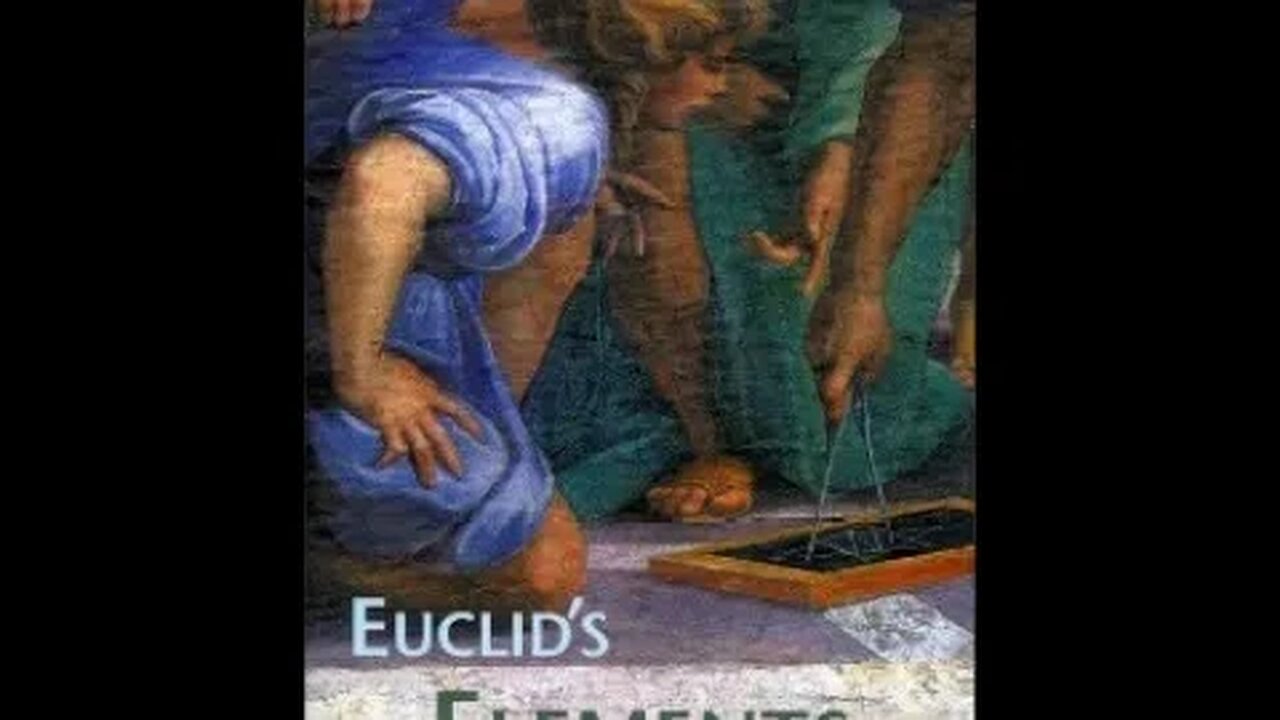Premium Only Content

Euclid's Elements A Quick Introduction
"Euclid alone has looked on beauty bare." --Edna St. Vincent Millay
Euclid (Ancient Greek: Εὐκλείδης Eukleidēs -- "Good Glory", ca. 365-275 BC) also known as Euclid of Alexandria, was a Greek mathematician, often referred to as the "Father of Geometry". He was active in Alexandria during the reign of Ptolemy I (323–283 BC). His Stoicheia (Elements) is a 13-volume exploration all corners of mathematics, based on the works of, inter alia, Aristotle, Eudoxus of Cnidus, Plato, Pythagoras. It is one of the most influential works in the history of mathematics, presenting the mathematical theorems and problems with great clarity, and showing their solutions concisely and logically. Thus, it came to serve as the main textbook for teaching mathematics (especially geometry) from the time of its publication until the late 19th or early 20th century. In the Elements, Euclid deduced the principles of what is now called Euclidean geometry from a small set of axioms. Euclid also wrote works on perspective, conic sections, spherical geometry, number theory and rigor. He is sometimes credited with one original theory, a method of exhaustion through which the area of a circle and volume of a sphere can be calculated, but he left a much greater mark as a teacher.
Thumbnail:
Dana Densmore, Thomas Little Heath (Translator)
Green Lion Press has prepared a new one-volume edition of T.L. Heath's translation of the thirteen books of Euclid's Elements. In keeping with Green Lion's design commitment, diagrams have been placed on every spread for convenient reference while working through the proofs; running heads on every page indicate both Euclid's book number and proposition numbers for that page; and adequate space for notes is allowed between propositions and around diagrams. The all-new index has built into it a glossary of Euclid's Greek terms.
Heath's translation has stood the test of time, and, as one done by a renowned scholar of ancient mathematics, it can be relied upon not to have inadvertantly introduced modern concepts or nomenclature.
We have excised the voluminous historical and scholarly commentary that swells the Dover edition to three volumes and impedes classroom use of the original text. The single volume is not only more convenient, but less expensive as well.
“The laws of nature are but the mathematical thoughts of God.”
“1. An 'unit' is that by virtue of which each of the things that exist is called one.
2. A 'number' is a multiple composed of units.”
“A straight line is said to have been cut in extreme and mean ratio when, as the whole line is to the greater segment, so is the greater to the lesser.”
― Euclid, Euclid's Elements
#Euclid, #EuclideanGeometry #Geometry #GoldenRatio #Historyofmathematics #mathematics
-
 7:45
7:45
Colion Noir
1 day agoThey Made Glock “Unconvertible” To Please Politicians, Guess What The Internet Did?
3.7K18 -
 24:55
24:55
Jasmin Laine
1 day agoCarney BRAGS About ‘Investment’—Poilievre Drops a FACT That Stops the Room
1.43K10 -
 23:42
23:42
The Kevin Trudeau Show Limitless
1 day agoThe Brotherhood’s Ancient Mirror Code Revealed
4.46K5 -
 11:21
11:21
Degenerate Jay
1 day ago $4.02 earnedSilent Hill's New Movie Could Be A Bad Idea...
8.44K3 -
![[Ep 801] Dems Setup & Disgusting Response to DC Tragedy | Giving Thanks With Rush](https://1a-1791.com/video/fwe2/79/s8/1/2/t/F/D/2tFDz.0kob-small-Ep-801-Dems-Setup-and-Disgu.jpg) LIVE
LIVE
The Nunn Report - w/ Dan Nunn
3 hours ago[Ep 801] Dems Setup & Disgusting Response to DC Tragedy | Giving Thanks With Rush
61 watching -
 20:23
20:23
Neil McCoy-Ward
6 hours ago🚨 She Wasn’t Ready for This (TOTAL PUBLIC HUMILIATION!)
16.1K12 -
 18:46
18:46
ThinkStory
1 day agoIT: WELCOME TO DERRY Episode 5 Breakdown, Theories, & Details You Missed!
19.1K -
 2:23:05
2:23:05
Badlands Media
14 hours agoBadlands Daily – Nov. 27, 2025
120K39 -
 6:20:00
6:20:00
FusedAegisTV
8 hours agoFUSEDAEGIS | They Put A Freakin' Blue Mage In THIS | Expedition 33 PART V
43K -
 1:16:04
1:16:04
Rebel News
5 hours agoHealth-care collapsing, Bloc says Quebec sends Alberta $, US Ambassador's advice | Rebel Roundup
26.8K24